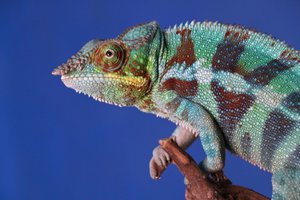
Vitamin A is essential for the maturation of epidermal cells found on the surfaces of many body tissues including skin, eyes, ears, lungs, kidneys, and bile ducts. When deficient epidermal tissue may become thickened or hyperkeratotic or may undergo squamous metaplasia decreasing tissue function. Many insectivorous lizards have diets deficient in vitamin A. This may be due to a lack of supplementation or using a supplement containing the wrong source of the vitamin. Unlike humans, many insect-eating reptiles cannot metabolize beta-carotene into vitamin A, so it is important to use a supplement that utilizes Retinol (pre-formed vitamin A) as its vitamin A source.
Patients with vitamin A deficiency may have chronic problems with their eyes including swelling, discharge, thickened dried discharge covering the corneas (often called “eye caps”), and abscesses of the glands of the eyes. Lizards with this condition often have a dull coloration and they may develop issues with retained sheds. Male lizards often develop hemipenal plugs.
Excessive exposure to UV light or poor quality UV light sources with the wrong spectrum (i.e. UVC), tumors, uric acid deposits, and trauma can also cause similar symptoms. Often animals with vitamin A deficiency develop secondary infections within affected tissues.
After obtaining a thorough dietary history and reviewing the current vitamin supplementation regime, your vet may recommend a fluorescein ophthalmic stain for corneal ulcers. Blood tests may also be recommended to evaluate the patient’s overall health.
Implementing appropriate vitamin A supplementation is essential. We recommend ZooMed’s Reptivite as this contains retinol. Supplement your reptile’s diet 2 times weekly for life. Your vet may give your reptile a “booster” injection of vitamin A or prescribe vitamin A eye drops. If needed, the diet should be addressed as well.
Sick patients may require supportive care with assisted feeding and fluid support. If your reptile has any concurrent problems or signs of infection, these should be treated as well.n
Prognosis is good with treatment and correction of husbandry, depending on severity and chronicity of clinical signs and concurrent diseases. Lesions present for greater than 6 months have a worse prognosis. Patients with severe ocular lesions may be blind and those with chronic eye problems may require prolonged care.
We recommend recheck examination in 7 days for additional vitamin injections and to evaluate response to treatment.
Copyright © All Rights Reserved
